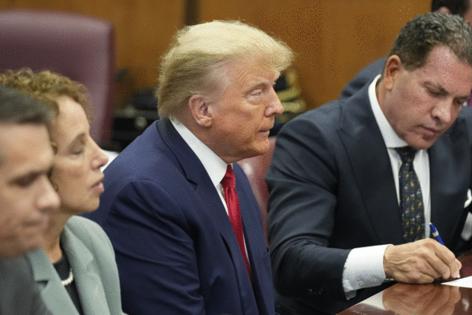Trump asks Supreme Court to stop sentencing in hush money case
Published in News & Features
NEW YORK — Donald Trump on Wednesday asked the Supreme Court to intervene in his criminal hush money case and stop his sentencing from going ahead on Friday.
The eleventh-hour request to the nation’s high court came a day after Trump’s attorney, Todd Blanche, failed to convince a New York appeals court to cancel the sentencing set for Friday morning as he appeals a set of rulings by the trial court judge, Manhattan Supreme Court Justice Juan Merchan.
It asks the Supreme Court to resolve whether Trump is entitled to a pause in proceedings as he challenges Merchan’s rulings in New York’s appeals courts, whether the admission of evidence at trial that correlated with his first term in office violated the doctrine of presidential immunity, and whether a sitting president’s complete immunity from prosecution extends to a president-elect.
“President Trump is already suffering grave irreparable injury from the disruption and distraction that the trial court abruptly inflicted by suddenly scheduling a sentencing hearing for the President-Elect of the United States, on five days’ notice, at the apex of the Presidential transition,” reads the emergency petition filed by Trump lawyers.
“These harms continue to increase as the New York courts deny relief and the sentencing hearing approaches.”
Justice Sonia Sotomayor, assigned to emergency requests filed in New York, asked the Manhattan district attorney’s office to respond to the request by Thursday at 10 a.m.
Merchan on Friday unexpectedly scheduled Trump’s sentencing for 10 days before his inauguration in a ruling that denied his request made after his election victory to vacate the jury’s guilty verdict and dismiss the underlying indictment.
“To vacate this verdict on the grounds that the charges are insufficiently serious given the position Defendant once held, and is about to assume again, would constitute a disproportionate result and cause immeasurable damage to the citizenry’s confidence in the Rule of Law,” Merchan wrote.
In the decision, Merchan also rejected Trump’s argument that the Supreme Court’s ruling on presidential immunity protected him from the criminal proceedings in New York as the president-elect. The decision handed down by the high court’s conservative majority in July, a month after Trump was found guilty, determined that presidents are largely shielded from criminal liability for acts they carry out during their official duties.
In December, Merchan found that evidence at trial, including testimony by Trump’s former White House communications director Hope Hicks about her private conversations with Trump and threatening tweets directed at his ex-fixer Michael Cohen on his presidential social media accounts, was not barred by the immunity ruling as they related to Trump’s unofficial conduct.
The judge on Friday said he was inclined to sentence Trump to an unconditional discharge, meaning Trump would not face jail time or any other punishment, and said he could appear by video. The charges carry up to four years in prison, and it is virtually unheard of for someone found guilty of felonies in Manhattan to see no punishment at all.
Should the Supreme Court delay Trump’s case any longer than Jan. 20, when he takes office, it’s unlikely the conviction will be finalized before Trump’s second term in the White House concludes.
In a statement, Trump spokesman Steven Cheung said, “President Trump’s legal team filed an emergency petition with the United States Supreme Court, asking the Court to correct the unjust actions by New York courts and stop the unlawful sentencing in the Manhattan D.A.’s Witch Hunt.”
A spokeswoman for the Manhattan district attorney told the New York Daily News prosecutors would respond in court papers.
A jury on May 30 found Trump, 78, guilty of 34 felony counts of falsifying business records stemming from a scheme to hide embarrassing details about his past from the electorate in 2016.
The case centered on payments he made to Cohen during his first year in the White House, which reimbursed his longtime former fixer for paying off porn star Stormy Daniels in the lead-up to the 2016 presidential election. Trial evidence showed Daniels was one of three hush money recipients.
The Manhattan criminal case was the only one of four brought against Trump after his first term that made it before a jury. It set him up to become the first convicted felon to serve as U.S. president. As the charges are state-level, he cannot pardon himself. He is expected to appeal his conviction if his sentencing goes ahead.
_____
©2025 New York Daily News. Visit at nydailynews.com. Distributed by Tribune Content Agency, LLC.







Comments